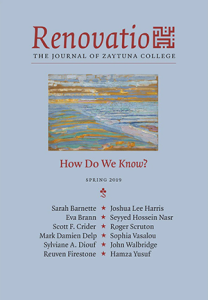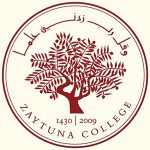Renovatio Journal 5 (Vol.3, No.1 Spring 2019): How Do We Know?

Editor-in-Chief: Hamza Yusuf
Publisher: Zaytuna College
Year of Publication: 2019
Print Length: 123 pages
Genre: Islamic Studies / Theology, Ethics and Philosophy; Hadith, Sunnah & Sirah, History, Science, Qur’anic Studies; Non-Fiction / Religious Studies
Topic: Muslim, Islam, Qur’an, Prophet Muhammad ﷺ, Ethics & Morality, Epistemology, Dialogue, Language & Literature, Cultural Heritage/Legacy, Scholarship & Knowledge, Language & Literature, Skepticism, Secularism, Pluralism, Religious Authority, Modernity, Modernism, Modern; Postmodernity, Postmodernism, Postmodern; Religion, Religious Thoughts & Philosophy
Renovatio (renovatio.zaytuna.edu) is a Muslim journal about the ideas that have shaped our past and present world. We ask scholars, theologians, and writers to examine timeless questions and today’s moral challenges by drawing from the enduring texts of revelatory faith traditions and current thinking from philosophy, theology, and ethics to history, politics, the social sciences, and beyond.
Vol.3 No.1: How Do We Know?
The Spring 2019 issue of Renovatio (“How Do We Know?”) seeks to explore how a broader view of knowledge could change the way we understand our world today.
Table of Contents
Contributors
1. Medina and Athena: Restoring A Lost Legacy – Hamza Yusuf
The divorce between Athena and Medina explains much of what went wrong in the Muslim world.
2. Why Jews Don’t Proselytize – Reuven Firestone
In an ancient world teeming with competing tribal deities, the monotheism of the Jews was distinctive. Was it merely an accident of history that they didn’t spread their faith?
3. The Many Sides of Knowledge – Sarah Barnette
If the knowledge we gather is partial and limited, can we truly understand the feelings and experiences of others?
4. The Soul of Rhetoric in the Age of Amazon – Scott F. Crider
Our digital lives are so mediated by soulless algorithms that it seems absurd to imagine genuine human relationships governing our online interactions.
5. Must Religious Duty Conflict with Political Order? – Roger Scruton
To secure the kind of religious freedoms Muslims desire, we must revisit Muslim commitment to religious pluralism and shared obedience to sovereign powers.
6. To See the World for the First Time – Sophia Vasalou
Can religious traditions help us see what is most mysterious in what is most ordinary?
7. What Islam Gave the Blues – Sylviane A. Diouf
The blues is neither African nor Islamic—rather, it’s an African American creation shaped by some of the most enduring contributions of West African Muslims to American culture.
8. Can We Live in Harmony with Nature? – Seyyed Hossein Nasr
The roots of our environmental crisis are often neglected because, were they be considered, our worldviews and manners of living would necessarily have to change.
9. The Islamic Art of Asking Questions – John Walbridge
Muslims of the past always tolerated permanent disagreement even about versions of religious truth. Can modern Muslims recapture this tradition?
10. Belief in the Obvious – Joshua Lee Harris
As truth seekers, we shield ourselves from sophistry through practiced skepticism. But by wielding the weapon of incredulity, could there be another evil that we unwittingly invite?
11. How We Split the World Apart – Eva Brann & Hamza Yusuf
We often understand philosophy as secular and rational and faith as transcendent and irrational. But are the two really separate?
12. Blessed Opposition – Mark Damien Delp
The principle of non-contradiction—that the same thing cannot both be and not be—is routinely denied in modern thought, but this rejection never confronts its real authority.

Zaytuna College was founded in Berkeley, California, with a mission to educate and prepare morally committed professional, intellectual, and spiritual leaders who are grounded in the Islamic scholarly tradition and conversant with the cultural currents and critical ideas shaping modern society, through a traditional liberal arts education.
Source: https://zaytuna.edu/about
More from Zaytuna College in this library, click here.

Hamza Yusuf is president of Zaytuna College in Berkeley, California, the first accredited Muslim liberal arts college in the United States. A leading proponent of classical learning, the traditional liberal arts, and great books education in both the Western and Muslim traditions, he has translated, authored, and coauthored numerous publications, including scholarly books and articles as well as papers on major current areas of ethical concern. He holds traditional advanced degrees (ijazaat) in Islamic law and theology, as well as a BA in Religious Studies (San Jose State University) and a PhD from the Graduate Theological Union in Berkeley, California.
Source: https://sandala.org/pages/about-us
More from Hamza Yusuf in this library, click here.
